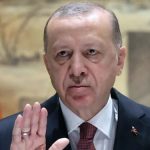ON FRIDAY, DECEMBER 30, 2022, an assailant on a motorcycle opened fire on Sinan Ateş, the leader of Turkey’s most feared paramilitary force, known as the Grey Wolves. By that evening, the 38-year-old Ateş had expired in an Ankara hospital, prompting analysts to forewarn that Turkish politics had entered new and unchartered territory. Indeed, some observers claim that Ateş’ assassination may impact Turkey’s upcoming presidential elections in unpredictable ways. The leading political figures in this strategically important NATO member-state, including its authoritarian leader, Recep Tayyip Erdoğan, are paying close attention.
Turkey’s Far-Right Shock Troops
Known officially as the Idealist Clubs Educational and Cultural Foundation, the Grey Wolves organization is the paramilitary arm of the Nationalist Movement Party (MHP), a militant political force that occupies most of the far-right space of Turkish politics. The MHP espouses authoritarian and anti-Western views and is violently opposed to negotiations with Turkey’s ethnic minorities, including the Kurds. Its politics appeal to ultra-conservative voters, who are usually male and over the age of 35. The Grey Wolves operate as the MHP’s shock troops, often engaging in bloody street fights against Kurds, leftists, and other popular forces that stand in opposition to the Turkish far-right. Known for their machismo and violent bravado, the Grey Wolves appeal to working-class men in their teens and twenties. In essence, therefore, the MHP and the Grey Wolves are two sides of the same coin.
In 2015, the MHP formed an electoral pact with President Erdoğan’s Justice and Development Party (AKP). The formation of this pact, known as the People’s Alliance, marked the culmination of a long process of informal cooperation between the two sides, which had been going on since at least 2007. The People’s Alliance has been instrumental in preserving the AKP’s domination of Turkish political life in recent years, despite the loss of popularity that President Erdoğan has been experiencing. Currently the AKP relies directly on the MHP’s parliamentary support to rule Turkey with a minority government. The Grey Wolves, which tend to be more unruly than their parent organization, are nominally in support of Erdoğan, but tend to see him as too mellow and not sufficiently authoritarian.
The Fragmentation of the MHP
The MPH likes to project itself as a unified militant organization. In reality, it has always been the product of an uneasy alliance between disparate far-right groups. Its membership ranges from social conservatives to ultranationalists, Hanafi (Sunni) puritans and even neo-fascists. In 2017, when the MHP and the AKP formed the People’s Alliance, several of these groups voiced serious misgivings about aligning themselves with Erdoğan. Eventually, a vocal faction of pro-Western and secularist conservatives left the party over concerns that the MHP would be completely absorbed by the pro-Islamist and anti-Western AKP.
These dissenters proceeded to form the İyi Parti (Good Party), a reformist conservative movement, which has since grown to rival the MHP in popularity. Some observers now claim that the formation of the Good Party may have halved the MHP’s electoral strength. As can be expected, the ideological split between the MHP and the Good Party quickly spilled over to the Grey Wolves. By 2021, dozens of leading Grey Wolves members had left the group and had joined the splinter organization. Throughout that time, the charismatic Ateş, who had been appointed chairman of the Grey Wolves in 2019, remained largely silent.
By 2020, however, there were rumors that Ateş was himself close to resigning from the MHP and joining the Good Party. Had that happened, it would have placed Devlet Bahçeli, the veteran chairman of the MHP, in a very difficult position, as it would most likely further-weaken his rule inside the MHP. The rumors that Ateş may soon leave the MHP intensified in April of 2020, when he announced his resignation from the post of chairman of the Grey Wolves. However, Ateş did not resign from the MHP, nor did he leave the Grey Wolves. In his resignation letter, he praised the militant organization and declared his allegiance to Bahçeli. Nevertheless, many believed that Ateş’ resignation from the Grey Wolves was the first step in his gradual distancing from the MHP, a process that would most likely conclude with him openly joining the Good Party.
Who Killed Ateş?
By all accounts, Ateş was killed just weeks before officially joining the Good Party. Following his assassination, some of his closest advisors said he had been holding rounds of consultations with Good Party leaders in the weeks before he was killed. So far, 15 individuals have been arrested by the Ankara Police Department, which is in charge of the investigation into Ateş’ murder. All have strong connections with the MHP or the Grey Wolves. Moreover, no senior leader of the Grey Wolves or the MHP, including Bahçeli, has issued a statement of condolence about Ateş’ killing. This is highly peculiar, given that Ateş had spent his entire adult life in the Grey Wolves, and was Bahçeli’s prodigy and closest confidant.
But was this a political assassination? One must keep in mind that the Grey Wolves is not simply a political organization. It is also a powerful economic conglomerate, with complex business interests that, some claim, often cross the line between legitimate and illegitimate dealings. Some of these illicit activities allegedly include the transportation of illegal drugs, selling protection services, running prostitution rings, as well as engaging in large-scale human trafficking within Turkey, as well as in Europe and Asia. It is therefore difficult to separate the Grey Wolves’ —and arguably MHP’s— political role from its financial activities. It follows that one should not completely rule out the possibility of a criminal or mafia-related motive behind Ateş’ killing.
Major Political Ramifications
Nevertheless, Ateş’ assassination has direct, and possibly enormous, political ramifications for Turkey, as the already country braces for a highly polarized presidential election this coming May. Indeed, there is a growing sense among seasoned observers that the potential consequences of the Ateş affair for the upcoming election may be just beginning to be seen. There are claims that, as a result of the MHP-Good Party split, and the ensuing vendetta between the two factions, the MHP’s electoral support may have dropped to below 4 percent of the national vote. If true, that would contrast dramatically with the group’s electoral popularity in 2015, which peaked at over 14 percent of the national vote.
With a weakened MHP, it is likely that President Erdoğan’s ability to cling on to power may weaken substantially in the coming months. Recent polls show the Turkish strongman may in fact end up third in May’s election, which would be a remarkable development for such a dominant figure in modern Turkish political life. For several years now, the MHP has been referred to as “Erdoğan’s political lifeline”. This lifeline is now shrinking, and the Ateş affair may deliver the far-right party a fatal blow. An unstable and weakened MHP would likely have a dramatic impact on the political future of Erdoğan, and may alter the whole of Turkish politics in unprecedented ways.
Author: Joseph Fitsanakis
Source: Intelnews



